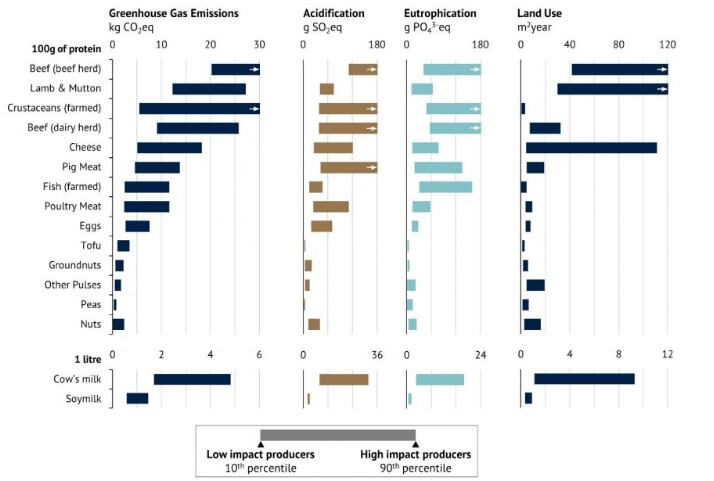Researchers at Oxford University and Swiss institute, Agroscope, quantified environmental impacts such as greenhouse gas emissions (GHG), land and water use, ocean acidification and eutrophication.
Joseph Poore and Thomas Nemecek analysed 570 studies of life cycle assessment (which tracks environmental impacts associated with all stages of a product's life) for more than 38,000 farms and 1,600 processors, packaging types and retailers in 123 countries.
The team assessed how different production practices and geographies lead to altered environmental impacts for 40 foods.
They found environmental impact of producing the same goods can vary 50-fold.
Change diet to have environmental impact
Animal product free diets deliver greater environmental benefits than buying sustainable meat or dairy or changing production practices.
Plant-based diets reduce food's emissions by up to 73% depending on place of residence.
This reduction is in GHG, acidifying and eutrophying emissions as well as freshwater withdrawals which fell by a quarter.
Global agricultural land would also be reduced by around 3.1 billion hectares (76%).

Poore, from the Department of Zoology and the School of Geography and Environment at Oxford University, said two things that look the same in shops can have different impacts on the planet.
“We currently don’t know this when we make choices about what to eat. Further, this variability isn’t fully reflected in strategies and policy aimed at reducing the impacts of farmers.”
High-impact beef producers create 105kg of CO2 equivalents and use 370m2 of land per 100g of protein - 12 and 50 times greater than low-impact producers.
Low-impact beans, peas and other plant-based proteins can create just 0.3kg of CO2 equivalents (including processing, packaging and transport), and use just 1m2 of land per 100g of protein.
One pint of beer can create three times more emissions and use four times more land than another.
The dataset revealed potential trade-offs of impact-reducing efforts (for already low-emission Northern European barley farms, reducing land use would increase GHG emissions per kg of grain).
Diverse solutions needed
Poore said agriculture is characterised by millions of diverse producers which creates variation in environmental impact and makes it challenging to find solutions.
“An approach to reduce environmental impacts or enhance productivity that is effective for one producer can be ineffective or create trade-offs for another. This is a sector where we require many different solutions delivered to many millions of different producers.”
Lowering consumption of items such as oils, alcohol, sugar and stimulants by 20% by avoiding high-impact producers reduces the greenhouse gas emissions of these products by 43%.
Producers can use new technology to get information on inputs, outputs, climate and soil to quantify environmental impacts but there are limits on how far it can be reduced.
Researchers suggested communicating environmental impacts to consumers could be done through labels as well as with taxes and subsidies.
Poore said ways need to be found to change conditions so it is better for producers and consumers to act in favour of the environment.
“Environmental labels and financial incentives would support more sustainable consumption, while creating a positive loop: Farmers would need to monitor their impacts, encouraging better decision making; and communicate their impacts to suppliers, encouraging better sourcing.”
Source: Science
“Reducing food’s environmental impacts through producers and consumers”
Authors: J. Poore and T. Nemecek
